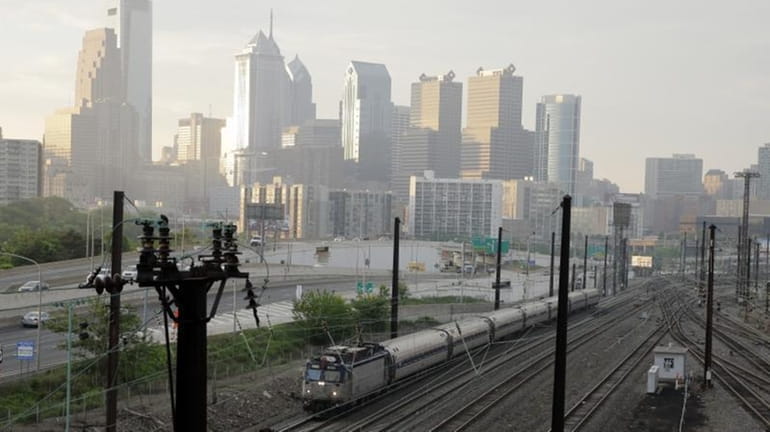Why Amtrak and John Q. Public hate the insurance companies

An Amtrak train travels northbound from 30th Street Station, Monday, May 18, 2015 in Philadelphia. Amtrak's Northeast Corridor trains resumed service Monday following last week's deadly derailment that killed eight people and injured more than 200 others. Credit: AP
When we buy insurance for our cars or homes or other property, we do so in the hopes that if something bad happens to our stuff, the insurance will allow us to get it fixed, or replaced. That's assuming we didn't set our property on fire to appease "the voices," or pour 450 gallons of fresh honey on it, or allow dead, dry trees to sway in the wind above it until they snapped, raining down terror and pinecones and ceilings.
The perfect insurance policy's wording would be simple, something along the lines of, "If your stuff gets screwed up, we've got you covered, unless it gets screwed up because you're acting the fool. 'Cause acting the fool ain't cool."
But it seems we are never offered simple insurance policies that just cover anything bad that happens to whatever we need to protect at a mathematically appropriate price. We can only buy unintelligible policies several hundred pages long that subdivide the various ways our belongings can get trashed into so many categories that . . . well, it's just madness.
Was it a flood or wind-pushed water? A hurricane or a tropical storm? Was it hail or rain, lightning or faulty wiring? Was it a normal occurrence or an act of God or an act of Satan or a hammer strike of Thor?
We don't know. We often argue it was whatever will get us a check. "No, it was definitely wind-pushed water because . . . I'm covered for that."
Insurance companies often argue that it was whatever won't get us a check. "No, it was definitely flooding, because I have profit-sharing."
God, Satan and Thor, as is so often the case, won't respond to subpoenas.
Now we're finding out that governmental entities have the same problem as us small-fry. Amtrak will not be paid fully, or even close to fully, for the superstorm Sandy flooding of the East River train tunnels. A judge recently ruled that the insurance payout would be capped at $125 million, even though the repairs will be several times that, because all the damage was caused by flooding.
So you're not alone, Sandy suffering homeowners who can't get paid. Get shut out because the winds didn't climb a few more miles per hour to reach hurricane status? Can't prove it was wind and not water that destroyed your home? The federal government is in the same boat.
If Amtrak had been able to show, as it asserted, that much of the damage (more than 13 million gallons of water poured in) was caused by wind-pushed water . . . more money. If it had won the argument that the damage caused by corrosive salts and chloride left by flooding is separate from the damage caused by flooding . . . more money.
Clearly, what Amtrak needed was policies that say, "If the tunnel gets screwed up, we'll pay to fix it," priced to reflect that broad risk.
I would be remiss if I didn't point out that the idea of a federal entity like Amtrak buying insurance is stupid. Because it owns presses that print money, the federal government can afford to self-insure. A billion for tunnels? Washington loses that much pocket change under the couch every week.
But if the federal government buys a policy, it should pay off fully. And when we buy policies, they ought to be ones that pay off fully.
I'm not suggesting a new law; I'm suggesting a profit opportunity. Policies that cover all damage would cost more, but I think many people and businesses and governments would pay more.
And it might not cost as much more as we'd instinctively think. If the insurance companies could stop spending so much money fighting claims, they'd have more money available to pay them.
Lane Filler is a member of Newsday's editorial board.
